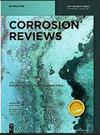Microbiologically influenced corrosion behavior of 304 stainless steel in ZnO nanofluids
IF 3.2
4区 材料科学
Q3 ELECTROCHEMISTRY
引用次数: 0
Abstract
Abstract The microbiologically influenced corrosion (MIC) behavior of 304 stainless steel by sulfate-reducing bacteria (SRB) in ZnO nanofluids was studied by electrochemical measurements, antibacterial activity tests and surface analysis. The results showed that ZnO nanoparticles (NPs) had little effect on the corrosion resistance of 304 stainless steel, but could effectively inhibit the MIC of stainless steel and reduce the adhesion of biofilm on its surface, which was related to the antibacterial effect of ZnO NPs. The antibacterial effect of 100 mg/L ZnO NPs reached 89.5 %. Electrochemical tests showed that with the increase of the concentration of ZnO NPs, the passive current density of the stainless steel electrode decreased, the film resistance increased in ZnO nanofluids containing SRB, and the MIC was inhibited. The antibacterial effect of ZnO NPs is mainly due to the formation of strongly oxidising ·OH in water. The presence of ZnO NPs inhibited the formation of biofilm and deposition of sulfide on stainless steel surface, thus slowing down the corrosion damage of SRB to stainless steel.微生物对304不锈钢在ZnO纳米流体中腐蚀行为的影响
摘要通过电化学测量、抗菌活性测试和表面分析,研究了硫酸盐还原菌(SRB)对304不锈钢在ZnO纳米流体中的微生物腐蚀行为。结果表明,ZnO纳米粒子对304不锈钢的耐腐蚀性影响不大,但能有效抑制不锈钢的MIC,降低生物膜在其表面的粘附,这与ZnO纳米粒子的抗菌作用有关。100的抗菌效果 mg/L ZnO纳米粒子达到89.5 %. 电化学测试表明,随着ZnO NPs浓度的增加,在含有SRB的ZnO纳米流体中,不锈钢电极的无源电流密度降低,膜电阻增加,MIC受到抑制。ZnO纳米粒子的抗菌作用主要是由于在水中形成强氧化性·OH。ZnO纳米粒子的存在抑制了不锈钢表面生物膜的形成和硫化物的沉积,从而减缓了SRB对不锈钢的腐蚀损伤。
本文章由计算机程序翻译,如有差异,请以英文原文为准。
求助全文
约1分钟内获得全文
求助全文
来源期刊

Corrosion Reviews
工程技术-材料科学:膜
CiteScore
5.20
自引率
3.10%
发文量
44
审稿时长
4.5 months
期刊介绍:
Corrosion Reviews is an international bimonthly journal devoted to critical reviews and, to a lesser extent, outstanding original articles that are key to advancing the understanding and application of corrosion science and engineering in the service of society. Papers may be of a theoretical, experimental or practical nature, provided that they make a significant contribution to knowledge in the field.
 求助内容:
求助内容: 应助结果提醒方式:
应助结果提醒方式:


